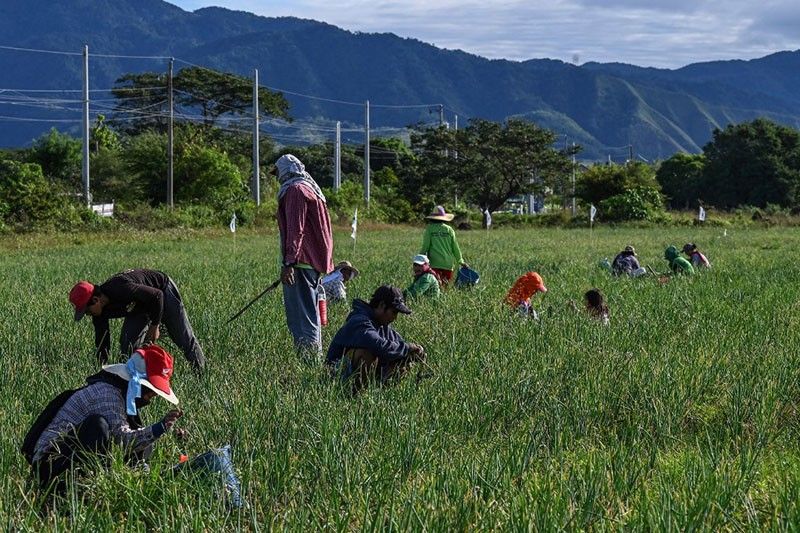Safeguarding Philippines' agriculture sector from illicit trade

The Philippines is endowed with rich agricultural lands and natural resources. Ideally, this is one aspect of the economy that can lead the country towards prosperity and progress.
Over the past many years, however, the agriculture, forestry and fishing sector has been experiencing very meager growths, based on data from the Philippine Statistics Authority (PSA).
In 2022, the sector expanded by only 0.5%. Its share to the total gross domestic product (GDP) has also visibly lagged behind the industry and services sectors, both of which accounted for 29.7% and 61.4% of the economy, respectively, in 2022.
Meanwhile, agriculture’s share in the same year was only 8.9%. While the performance of the agriculture sector has been unremarkable, it accounts for around 20% of the country’s labor force.
Worse, natural calamities and the worsening impacts of climate change has led to costly damages on the Philippine agriculture sector. According to the United Nations World Food Programme (WFP), an average of 20 tropical cyclones enters the Philippine Area of Responsibility every year, with around 8 or 9 actually crossing the country.
As such, extreme weather events over the past decade cost the Philippines P463 billion worth of damages. Out of this figure, 62.7% or P290 billion were damages to the agriculture sector.
With the recent typhoon “Egay” that hit northern Luzon, the Department of Agriculture reported that as of August 3, over 170,000 farmers and fisherfolk have been affected while agricultural damages incurred has risen to P4.47 billion. Not only are crop production hampered, but so are the livelihoods of millions of Filipinos.
As if these were not enough, an equally big challenge to the agriculture sector is illicit trade. Due to its clandestine nature, illicit trade is difficult to monitor and determine its actual scope. Encouragingly, one of the administration’s legislative priorities is the amendment to Republic Act No. 10845 or the Anti-Agricultural Smuggling Act, which can help protect local farmers and consumers, as well as to attain food security. Currently, RA 10845 classifies large-scale agricultural smuggling as economic sabotage.
Notably, the most common goods which are vulnerable to such illegal activity are those that are subject to high taxes, like tobacco. Because it is considered as a “sin” product, the taxes imposed are high. “Sin” taxes are used to fund universal health care in the Philippines.
In a recent event organized by the National Tobacco Administration (NTA), its Regulatory Head Robert Ambros stated that the revenue losses from tobacco smuggling reach about P30 billion annually.
Bureau of Internal Revenue (BIR) Commissioner Romeo Lumagui Jr. noted that over the past five years, the tobacco industry contributed an average of P147 billion in excise tax payments annually, accounting for at least 50% of total annual excise tax revenues.
Despite this, Lumagui said that illicit trade diminishes what should have been collected by the government. Illicit trade has a “far-reaching impact on every sector of society, and an extremely damaging effect on the economy.”
He elaborated: “Its most immediate impact is the loss of tax revenues that are urgently needed to fund our economic recovery efforts, but illicit trade also floods the market with sub-standard products that may ultimately prove detrimental to public health. Illicit trade also gives rise to unfair competition between illegal merchants and legitimate business enterprises, a situation that in the end is harmful to the local workforce.”
“Most alarming of all, in many instances, money generated from illicit trade is used to fund organized crime syndicates, whose operations and members pose enormous dangers to society at large,” he added.
Bureau of Customs (BOC) Commissioner Bienvenido Rubio also shared that in March 2023, the bureau launched its 5-Point Priority Program. This includes efforts to further strengthen border security and curb smuggling.
But then again, having a baseline point is just the start of the game plan. The key result area depends on what authorities will actually do. Lip service does not create a value-added solution to the problem.
Addressing illicit trade is crucial in safeguarding the economy, particularly the country’s agricultural sector. Such illegal activity poses severe threats to economic stability and growth as it undermines legitimate markets, tarnishes the reputation of legitimate businesses, erodes government revenues, endangers the health of consumers, compromises jobs, and puts at risk food security.
Hence, a collective effort of governments, international organizations, private stakeholders, and even civil society organizations is imperative to protect the agricultural sector and, in turn, strengthen the overall economy against the damaging impacts of illicit trade.
Furthermore, embracing digital technologies for heightened transparency, and improving law enforcement can dramatically contribute to the fight against illicit trade. As we have seen, taxation as a default mechanism does not work. In fact, it even promotes other forms of illicit trade.
At the very least, the taxation-dependent shotgun approach in dealing with illicit trade should be revised and complemented instead with other more focused solutions, such as proper regulations and serious law enforcement.
Through a resolute commitment to curb illicit trade and ensure a level playing field for legitimate market players, an empowered citizenry can help ensure a sustainable agriculture sector that fosters economic prosperity and secures the welfare of the nation and the citizens.
Venice Isabelle Rañosa is a research manager at think tank Stratbase ADR Institute.
- Latest




























